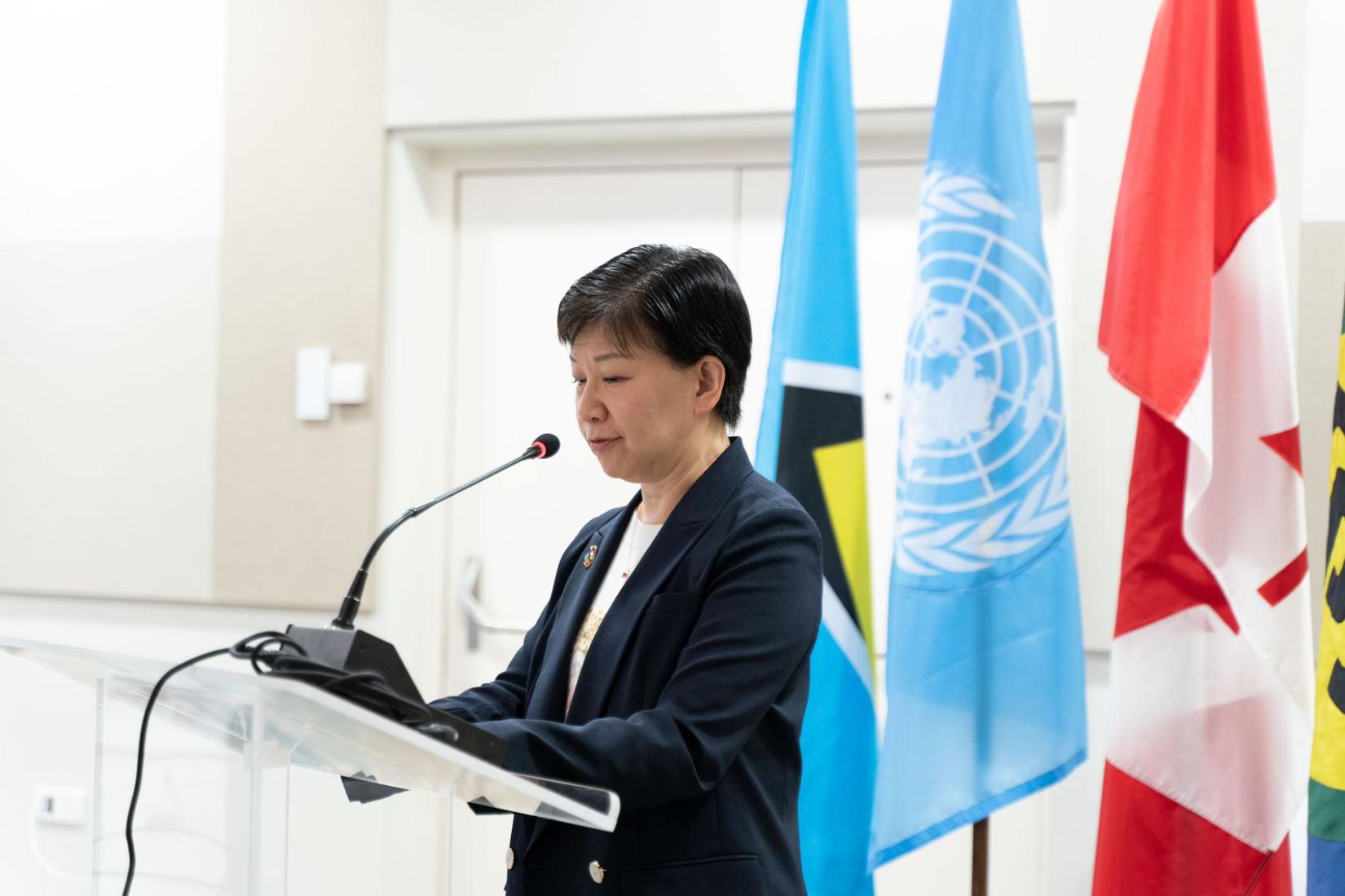Opening Remarks by Ms. Izumi Nakamitsu High Representative for Disarmament Affairs - 3rd Annual Meeting of States of the Caribbean Firearms Roadmap – Ministerial Meeting
Embracing peace and sustainable development through regional cooperation in combating illicit firearms and ammunition in the Caribbean.

The Honourable Shawn Edward,
Acting Prime Minister and Minister for Education, Sustainable Development, Innovation, Science and Technology, and Vocational Training of Saint Lucia
The Honourable Dr. Virginia Poyotte,
Minister of Home Affairs of Saint Lucia
The Honourable Mr. Leslie Mondesir,
Attorney General of Saint Lucia
Lieutenant Colonel Michael Jones,
Executive Director of CARICOM IMPACS
Excellencies,
Distinguished Ladies and Gentlemen,
I am pleased to address this meeting of States of the Caribbean Firearms Roadmap. I would like to express my sincere gratitude to the Government of Saint Lucia for hosting this important event and for their warm and generous hospitality that makes this visit, my first to the Caribbean as High Representative, all the more special.
Small arms and light weapons (SALW) and their ammunition continue to be the leading cause of violent deaths worldwide.
They create multidimensional challenges and lead to devastating consequences on lives, livelihoods, and sustainable development across all regions, including this one. Tackling their illicit proliferation, trafficking, and misuse remains imperative.
While illicit small arms and light weapons are a global scourge, experiences vary across regions and subregions, and disproportionately affect small island States with limited resources.
The Caribbean is sadly no stranger to this reality, with some of the highest homicide rates in the world, over 70% of which are committed with firearms, almost double the global average of 40%.
The use of these weapons in interpersonal and gender-based violence, as well as in organized crime, has lethal consequences and devastating social and economic impacts.
This, in turn, limits societies’ full potential and hinders progress towards the achievement of the 2030 Agenda for Sustainable Development.
The United Nations Secretary-General’s policy brief on “A New Agenda for Peace,” released this past July, was prepared against this particularly difficult global peace and security backdrop. Among the priority areas, reducing the human cost of weapons calls for centering peace and security engagements on the need to save human beings from violence, and enact measures to foster human-centered disarmament. It also prioritizes addressing the proliferation, diversion, and misuse of small arms and light weapons and breaking down the longstanding silos between disarmament and development, human rights and humanitarian issues. Regional approaches and roadmaps, like the one that is the focus of today’s meeting, are also advocated in the brief.
Actions envisaged in this New Agenda can only be achieved through effective cooperation and coordination by the international community.
In this regard, the recent adoption of a set of political commitments constituting a new Global Framework on Through-life Conventional Ammunition Management is a tremendous achievement and a positive sign of hope in a challenging geopolitical environment. And it is one that owes a great deal to the sustained support by this region, whose delegates advocated tirelessly for the inclusion of ammunition in international arms control instruments and who participated very actively in its negotiation. I look forward to your continued active engagement in the next steps in its operationalization, including the enhancement of marking and tracing of ammunition.
Ladies and Gentlemen,
We cannot tackle illicit arms trafficking and misuse without considering regional dimensions, and without regional cooperation and regional initiatives such as the Caribbean Firearms Roadmap.
In the three years since its adoption, significant progress has been achieved, translating the regional initiative into tangible actions at the national level, including the adoption of National Action Plans by eight states.
I commend you for your dedication and commitment, and I am proud of the work that the UN Regional Centre for Peace, Disarmament and Development in Latin America and the Caribbean (UNLIREC) has done in support of your efforts and the excellent cooperation with The Caribbean Community (CARICOM) Implementation Agency for Crime and Security (IMPACS), as co-custodians. I would also like to thank the partners and donors for their invaluable support and contributions, in particular Canada, for making this meeting possible.
Much work remains to be done, however, in order to achieve the objectives laid out in the Roadmap.
Significant challenges remain.
One such challenge is the need for improved data collection, monitoring and evaluation, and reporting in the context of the Roadmap, which is rightfully an important focus of this year’s meeting. I hope that States will make full use of the online platform so that data collection and analysis can become a central cornerstone of the Roadmap.
Closing the data gap would enhance analysis and facilitate evidence-based action on diversion and misuse of small arms and light weapons and ammunition.
In the same vein, I commend recent studies by Roadmap partners, including UNODC and Small Arms Survey. Data collection and analysis help us to better understand the linkages between small arms and light weapons and development.
It will also allow us to better integrate small arms and light weapons dimensions into broader development frameworks.
Lastly, I would be remiss if I didn’t raise one of the most pressing firearms issues in the Americas: the situation in Haiti.
This past July, Secretary-General António Guterres visited the Caribbean, and expressed his grave concern at the security situation, the increasing humanitarian needs, and his support for a robust international security force – authorized by the UN Security Council – to be able to help the Haitian national police to defeat and dismantle the gangs. In Haiti, illicit firearms are exacerbating the profound and prolonged security crisis, enabling significant spikes in armed gang violence over the past few years.
As stated by the Secretary-General when he addressed CARICOM Heads of State, the challenges we see in Haiti require, from the international community, the levels of engagement and solidarity that CARICOM exemplifies.
They require a convergence of international efforts, including UN efforts, to adopt a more integrated approach to small arms and light weapons control, community violence reduction, and development.
My Office’s own efforts in Haiti, through UNLIREC, and especially upcoming efforts through a dedicated project which was just approved by Canada, will apply that integrated approach, and will be carried out in collaboration with, and as an integral part of, broader UN efforts in the country.
Excellencies, Ladies and Gentlemen,
Arms control is not only a step towards peace and security – it is a catalyst for sustainable development as well.
Without security, there can be no sustainable development.
Illicit weapons not only hinder efforts for achieving Sustainable Development Goal 16, but block progress towards almost all other Goals. They hamper access to quality education and health; exacerbate food insecurity; and aggravate gender-based inequalities.
Through our work here, however, we can reverse the trajectory of this knock-on effect, with progress on countering illicit weapons resulting in progress in other areas, as well.
I wish you a successful and productive meeting and I look forward to our exchanges.
Thank you very much for your attention.
Speech by









